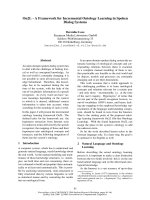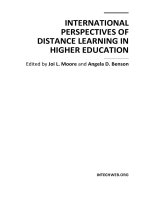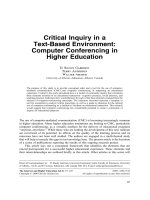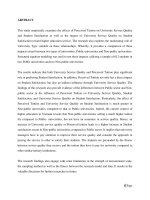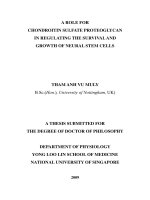A handbook for teaching and learning in higher education enhancing academic and practice
Bạn đang xem bản rút gọn của tài liệu. Xem và tải ngay bản đầy đủ của tài liệu tại đây (3.45 MB, 544 trang )
A Handbook for Teaching and Learning
in Higher Education
A Handbook for Teaching and Learning in Higher Education is sensitive to the competing
demands of teaching, research and scholarship, and academic management. Against these
contexts, the book focuses on developing professional academic skills for teaching.
Dealing with the rapid expansion of the use of technology in higher education and
widening student diversity, this fully updated and expanded edition includes new
material on, for example, e-learning, lecturing to large groups, formative and summative
assessment, and supervising research students.
Part 1 examines teaching and supervising in higher education, focusing on a range of
approaches and contexts.
Part 2 examines teaching in discipline-specific areas and includes new chapters on
engineering, economics, law, and the creative and performing arts.
Part 3 considers approaches to demonstrating and enhancing practice.
Written to support the excellence in teaching required to bring about learning of the
highest quality, this will be essential reading for all new lecturers, particularly anyone
taking an accredited course in teaching and learning in higher education, as well as all
those experienced lecturers who wish to improve their teaching. Those working in adult
learning and education development will also find it a particularly useful resource.
Heather Fry is the founding Head of the Centre for Educational Development at Imperial
College London.
Steve Ketteridge is Director of Educational and Staff Development at Queen Mary,
University of London.
Stephanie Marshall is Director of Programmes at the Leadership Foundation for Higher
Education and is currently Visiting Professor at Queen Mary, University of London.
A Handbook for Teaching and
Learning in Higher Education
Enhancing Academic Practice
Third edition
Edited by
Heather Fry
Steve Ketteridge
Stephanie Marshall
First edition published 1999
Second edition published 2003
by Routledge
This edition published 2009
by Routledge
270 Madison Ave, New York, NY 10016
Simultaneously published in the UK
by Routledge
2 Park Square, Milton Park, Abingdon, Oxon OX14 4RN
Routledge is an imprint of the Taylor and Francis Group, an informa business
This edition published in the Taylor & Francis e-Library, 2008.
“To purchase your own copy of this or any of Taylor & Francis or Routledge’s
collection of thousands of eBooks please go to www.eBookstore.tandf.co.uk.”
© 2003 individual contributors; 2009 Taylor & Francis
All rights reserved. No part of this book may be reprinted or reproduced
or utilised in any form or by any electronic, mechanical, or other means,
now known or hereafter invented, including photocopying and recording,
or in any information storage or retrieval system, without permission
in writing from the publishers.
Trademark Notice: Product or corporate names may be trademarks or
registered trademarks, and are used only for identification and explanation
without intent to infringe.
Library of Congress Cataloging in Publication Data
A handbook for teaching and learning in higher education : enhancing academic
practice / [edited by] Heather Fry, Steve Ketteridge, Stephanie Marshall.–3rd ed.
p. cm.
Includes bibliographical references and index.
1. College teaching–Handbooks, manuals, etc. 2. College teachers. 3. Lecture method
in teaching. I. Fry, Heather. II. Ketteridge, Steve. III. Marshall, Stephanie. IV. Title:
Teaching and learning in higher education.
LB2331.H3145 2008
378,1′25–dc22
2008009873
ISBN 0-203-89141-4 Master e-book ISBN
ISBN 10: 0–415–43463–7 (hbk)
ISBN 10: 0–415–43464–5 (pbk)
ISBN 10: 0–203–89141–4 (ebk)
ISBN 13: 978–0–415–43463–8 (hbk)
ISBN 13: 978–0–415–43464–5 (pbk)
ISBN 13: 978–0–203–89141–4 (ebk)
Contents
List of illustrations
Notes on contributors
Acknowledgements
Foreword
viii
x
xvii
xviii
Part 1 Teaching, supervising and learning in higher education
1
1
A user’s guide
Heather Fry, Steve Ketteridge and Stephanie Marshall
3
2
Understanding student learning
Heather Fry, Steve Ketteridge and Stephanie Marshall
8
3
Encouraging student motivation
Sherria L. Hoskins and Stephen E. Newstead
27
4
Planning teaching and learning: curriculum design and development
Lorraine Stefani
40
5
Lecturing to large groups
Ann Morton
58
6
Teaching and learning in small groups
Sandra Griffiths
72
7
E-learning – an introduction
Sam Brenton
85
❘
v
❘
vi
❘
Contents
8 Teaching and learning for employability: knowledge is not the only outcome
Pauline Kneale
9 Supporting student learning
David Gosling
99
113
10 Assessing student learning
Lin Norton
132
11 Supervising projects and dissertations
Stephanie Marshall
150
12 Supervising research students
Steve Ketteridge and Morag Shiach
166
13 Teaching quality, standards and enhancement
Judy McKimm
186
14 Evaluating courses and teaching
Dai Hounsell
198
Part 2 Teaching in the disciplines
213
15 Teaching in the disciplines
Denis Berthiaume
215
16 Key aspects of learning and teaching in experimental sciences
Ian Hughes and Tina Overton
226
17 Key aspects of teaching and learning in mathematics and statistics
Joe Kyle and Peter Kahn
246
18 Key aspects of teaching and learning in engineering
John Dickens and Carol Arlett
264
19 Key aspects of teaching and learning in computing science
Gerry McAllister and Sylvia Alexander
282
20 Key aspects of teaching and learning in arts, humanities and
social sciences
Philip W. Martin
300
Contents
❘ vii
21 Key aspects of teaching and learning in languages
Carol Gray and John Klapper
323
22 Key aspects of teaching and learning in the visual arts
Alison Shreeve, Shân Wareing and Linda Drew
345
23 Key aspects of teaching and learning: enhancing learning in
legal education
Tracey Varnava and Julian Webb
363
24 Key aspects of teaching and learning in accounting, business
and management
Ursula Lucas and Peter Milford
382
25 Key aspects of teaching and learning in economics
Liz Barnett
405
26 Key aspects of teaching and learning in medicine and dentistry
Adam Feather and Heather Fry
424
27 Key aspects of teaching and learning in nursing and midwifery
Pam Parker and Della Freeth
449
Part 3 Enhancing personal practice
467
28 Enhancing personal practice: establishing teaching and
learning credentials
Heather Fry and Steve Ketteridge
469
29 Teaching excellence as a vehicle for career progression
Stephanie Marshall and Gus Pennington
Glossary
Index
485
499
513
Illustrations
FIGURES
2.1
4.1
4.2
4.3
11.1
14.1
14.2
15.1
The Kolb Learning Cycle
The logical model of curriculum development
A modification to Cowan’s earlier model
Views of the curriculum
Supervisor–supervisee relationship in project supervision
Sources and methods of feedback
The evaluation cycle
Model of discipline-specific pedagogical knowledge (DPK) for
university teaching
24.1 The ‘for–about’ spectrum in business education
24.2 Shifting the focus along the ‘for–about’ spectrum
26.1 PBL at St George’s
15
52
53
54
153
202
208
219
384
391
430
TABLES
2.1
2.2
3.1
3.2
3.3
4.1
5.1
7.1
9.1
10.1
12.1
Learning styles
Classification of academic knowledge
Reasons for studying
Percentage of students agreeing with questions on the ASSIST scale
Motivational generalisations and design principles
The University of Auckland: graduate profile
Emphasising the structure of lectures using signals and clues
Hypothetical teaching situations and possible e-learning responses
Questions students ask themselves
Characteristics of grades A, B and C
University of East Anglia: full-time research degrees
❘
viii
❘
19
20
28
32
35–36
42
62
89–90
118
140
168
Illustrations
12.2
15.1
Doctoral qualifications obtained in the UK, 2001 to 2005
Dimensions associated with components of the knowledge base
for teaching
15.2
Dimensions associated with components of disciplinary specificity
15.3
Dimensions associated with components of the personal
epistemology
23.1
Skills and cognitive levels assessed by law coursework and
examinations
24.1
A critical reading framework for empirical academic papers
28.1A The UK Professional Standards Framework
28.1B Areas of activity, knowledge and values within the Framework
❘ ix
170
219–221
221
222
376
397
470
471
Contributors
THE EDITORS
Heather Fry is the founding Head of the Centre for Educational Development at
Imperial College London. After teaching and lecturing in Nigeria she worked at the
Institute of Education, London, and the Barts and Royal London School of Medicine
and Dentistry at Queen Mary, University of London. She teaches, researches and
publishes on academic practice in higher education. Her particular passions are how
teaching, curriculum organisation and manipulation of ‘context’ can support and
expand learning, especially in medical and surgical education. She has also been
involved in the development of several innovative programmes including a Master’s
in Surgical Education and another in University Learning and Teaching.
Steve Ketteridge is the first Director of Educational and Staff Development at Queen
Mary, University of London. His academic career began with a university lectureship
in microbiology. Subsequently he established the Postgraduate Certificate in Academic
Practice at Queen Mary and has developed strategy in areas such as learning and
teaching, skills and employability. He is a key reference point on supervision of
doctoral students in science and engineering, and advises universities and research
institutes across the UK. Recently he has been involved in international work on the
development of performance indicators for university teaching.
Stephanie Marshall is Director of Programmes at the Leadership Foundation for Higher
Education, where she has worked since 2003, and is currently Visiting Professor at
Queen Mary, University of London. Prior to this, she worked at the University of York,
where she taught and researched in the Department of Educational Studies, moving
on to set up the university’s first Staff Development Office. Subsequently she became
the Provost of Goodricke College, and worked in the Centre for Leadership and
Management. She has published widely.
❘
x
❘
Contributors
❘ xi
THE AUTHORS
Sylvia Alexander is Director of Access and Distributed Learning at the University of
Ulster. She has a wide knowledge of current practice in teaching, learning and
assessment resulting from previous involvement in a variety of national initiatives
including the Higher Education Academy.
Carol Arlett is the Manager for the Engineering Subject Centre and oversees the Centre’s
range of activities that aim to provide subject-specific support for engineering
academics. She has a particular interest in employer engagement and skills development.
Liz Barnett is Director of the London School of Economics (LSE) Teaching and Learning
Centre. At the LSE she has collaborated with colleagues both in supporting graduate
teaching assistants and encouraging innovatory teaching approaches. She previously
worked at the University of Southampton and has lectured on international health.
Denis Berthiaume is Director of the Centre for Learning and Teaching at the University
of Lausanne, Switzerland. His research interests include discipline-specific teaching in
higher education, reflective practice in teaching, and the assessment of learning in
higher education.
Sam Brenton is Head of E-Learning at Queen Mary, University of London. He is
particularly interested in the social uses and effects of new media and virtual worlds.
He has been an author, broadcaster, critic, journalist, poet and educational developer.
John Dickens is Director of the Engineering Subject Centre. He is also Professor of
Engineering Education, Associate Dean (Teaching) for the Faculty of Engineering, and
Director of the Engineering Centre for Excellence in Teaching and Learning (CETL) at
Loughborough University. He has 25 years of teaching experience in civil and structural
engineering design and received a National Teaching Fellowship in 2006.
Linda Drew is the Dean of Academic Development at the University of the Arts London,
UK. Linda is founding editor of the journal Art, Design and Communication in Higher
Education. She is also a Fellow and Vice-chair of the Design Research Society and Vicechair of the Group for Learning in Art and Design.
Adam Feather is a Consultant Geriatrician at Newham University Hospital Trust and a
Senior Lecturer in Medical Education at Barts and The London, Queen Mary’s School
of Medicine and Dentistry. He is married to the most understanding woman in the
world and has a Weapon of Mass Destruction, aged 4.
Della Freeth is Professor of Professional and Interprofessional Education within
City Community and Health Sciences, contributing to the CETL on Clinical and
Communication Skills developed jointly by City University and Queen Mary,
University of London.
xii
❘
Contributors
David Gosling has written widely on topics relating to learning and teaching in higher
education and in applied philosophy. Formerly Head of Educational Development at
the University of East London, he is now Visiting Research Fellow at the University of
Plymouth. He works as an independent consultant with many universities in the UK
and internationally.
Carol Gray is Senior Lecturer in Modern Languages in Education, University of
Birmingham. She is involved in the development of initial and in-service training for
modern languages and publishes on a range of related topics.
Sandra Griffiths was formerly a Senior Lecturer in Education at the University of Ulster.
She has wide experience of supporting and researching learning and teaching and of
developing, teaching, reviewing and consulting globally on postgraduate certificates
for university teachers. She is President of the All-Ireland Society for Higher Education
and a member of the International Council for Educational Development. In 2005 she
was awarded a National Teaching Fellowship.
Sherria L. Hoskins is a Principal Lecturer at the University of Portsmouth where she is
Course Leader for the B.Sc. Psychology and an operational member of the ExPERT
(Excellence in Professional Development through Education, Research and
Technology) CETL. In 2004 she was awarded a University Learning and Teaching
Fellowship. She is an active researcher, focusing on social cognitive aspects of learning
success, from school to university and beyond.
Dai Hounsell is Professor of Higher Education at the University of Edinburgh and
previously Director of the Centre of Teaching, Learning and Assessment at that
university. He publishes and advises widely on teaching and learning matters.
Ian Hughes is a National Teaching Fellow, Professor of Pharmacology Education,
University of Leeds, and has directed the Higher Education Academy Centre for
Bioscience, as well as other EU and UK projects, for example developing educational
software.
Peter Kahn is Educational Developer in the Centre for Lifelong Learning at the University
of Liverpool. He publishes widely on teaching and learning in higher education, and
is co-editor (with Joe Kyle) of Effective Learning and Teaching in Mathematics and its
Applications, also published by Routledge.
John Klapper is a Professor and Director of the Centre for Modern Languages, University
of Birmingham, where he also teaches in German Studies. He is a National Teaching
Fellow and publishes widely on various aspects of foreign language pedagogy and
teacher development.
Pauline Kneale is Professor of Applied Hydrology with Learning and Teaching in
Geography at the University of Leeds. She became a National Teaching Fellow in 2002
and is well known in the UK for her work on curriculum development and student
employability.
Contributors
❘ xiii
Joe Kyle was formerly Senior Lecturer and Director of Learning and Teaching in
the School of Mathematics and Statistics at Birmingham University. Mathematics
coordinator for the Higher Education Academy Mathematics, Statistics and
Operational Research Network, he is an editor of Teaching Mathematics and its
Applications.
Ursula Lucas is Professor of Accounting Education at Bristol Business School, University
of the West of England. Her research interests are in the development of a reflective
capacity within higher education and workplace learning. In 2001 she was awarded a
National Teaching Fellowship.
Gerry McAllister holds a B.Sc. and M.Sc. in Electronic Engineering and Ph.D. in
Computer Science. He is currently Director of the Subject Centre for Information and
Computer Sciences at the University of Ulster, where he is Professor of Computer
Science and Head of the School of Computing and Mathematics.
Judy McKimm works at the Centre for Medical and Health Sciences Education,
University of Auckland, New Zealand. She was formerly a Visiting Professor at the
University of Bedfordshire. She has a long-standing interest and involvement in quality
enhancement.
Philip W. Martin is Pro Vice-chancellor of De Montfort University. He has responsibility
for Academic Quality and for all Learning and Teaching across the university. His remit
also includes the student experience. He is a Professor of English and was formerly
Director of the English Subject Centre (for the teaching of English in universities) at
Royal Holloway, University of London.
Peter Milford is Interim Associate Director of Education for the South West Strategic
Health Authority. Before rejoining the NHS in 2002, he was a Principal Lecturer
in Accounting and Finance at Bristol Business School, University of the West of
England.
Ann Morton is Head of Staff Development at Aston University. She was previously
Programme Director for the Postgraduate Certificate in Learning and Teaching at the
University of Birmingham and continues to teach on the similar programme for new
lecturers at Aston.
Stephen E. Newstead is Professor of Psychology at the University of Plymouth, though
recently he has ventured into management territory as Dean, Deputy Vice-Chancellor
and even Vice-Chancellor. Back in the days when he had time to do research, his
interests focused on cognitive psychology and the psychology of higher education,
especially student assessment.
Lin Norton is a National Teaching Fellow (2007), Professor of Pedagogical Research and
Dean of Learning and Teaching at Liverpool Hope University. Her research interests
include student assessment which she pursues through her role as Research Director
of the Write Now CETL.
xiv
❘
Contributors
Tina Overton is Professor of Chemistry Education at the University of Hull and Director
of the Higher Education Academy Physical Sciences Centre. She has published on
critical thinking, context-based learning and problem solving.
Pam Parker spent many years in the School of Nursing and Midwifery, City University,
focusing on learning, teaching, assessing and curriculum development. She is
now co-director of CEAP (Centre for Education and Academic Practice) at City
University.
Gus Pennington now works as a consultant in the areas of change management and
quality enhancement. He is Visiting Professor at Queen Mary, University of London,
and a former chief executive of a national agency for promoting professional
development throughout the UK higher education sector.
Morag Shiach is Vice-principal (Teaching and Learning) at Queen Mary, University of
London. She has extensive experience of supervising research students and of
examining doctoral dissertations in English and cultural history. She has published
widely on cultural history, particularly in the modernist period.
Alison Shreeve is Director of the Creative Learning in Practice CETL at the University of
the Arts London, UK. She is currently engaged in doctoral research investigating the
experience of the practitioner tutor in art and design.
Lorraine Stefani is Director of the Centre for Academic Development at the University
of Auckland, New Zealand. Her particular interests are curriculum design and
development for a twenty-first-century university education; innovative strategies for
assessment of student learning, and institutional strategies to promote student
engagement.
Tracey Varnava is Associate Director of the UK Centre for Legal Education, the Higher
Education Academy Subject Centre for Law based at the University of Warwick. Before
moving to Warwick, she was a Lecturer in Law at the University of Leicester.
Shân Wareing is Dean of Learning and Teaching Development at the University of the
Arts London, UK, where she leads the Centre for Learning and Teaching in Art and
Design. She is also a Fellow and Co-Chair of the Staff and Educational Development
Association.
Julian Webb is Director of the UK Centre for Legal Education and Professor of Legal
Education at the University of Warwick, where he also leads the UK’s only Master’s
degree in Legal Education.
Case study authors
Chapter authors who have written case studies have not been re-listed. National
attribution has been assigned if outside the UK. Academic titles and departments can be
found within the case studies.
Contributors
Julie Attenborough, City University
Juan Baeza, now King’s College London
Simon Bates, University of Edinburgh
Mick Beeby, University of the West of England
Simon Belt, University of Plymouth
Paul Blackmore, now King’s College London
Chris Bolsmann, Aston University
Melanie Bowles, University of the Arts London
Jim Boyle, University of Strathclyde
Margaret Bray, London School of Economics and Political Science
David Bristow, Peninsula Medical School
Peter Bullen, University of Hertfordshire
Liz Burd, University of Durham
Christopher Butcher, University of Leeds
Rachael Carkett, now at University of Teesside
Hugh Cartwright, Oxford University
Marion E. Cass, Carleton College, USA
Tudor Chinnah, Peninsula Medical School
Elizabeth Davenport, Queen Mary, University of London
Matt Davies, Aston University
Russell Davies, Peninsula Medical School
Val Dimmock, City University
Roberto Di Napoli, Imperial College London
Caroline Elliott, University of Lancaster
John Fothergill, University of Leicester
Ann Gilroy, University of Auckland, NZ
Christopher Goldsmith, De Montfort University
Anne Goodman, South West and Wales Hub (Cardiff University)
Nuala Gregory, University of Auckland, NZ
Louise Grisoni, University of the West of England
Mick Healey, University of Gloucestershire
Iain Henderson, Napier University
Sarah Henderson, University of Auckland, NZ
Siobhán Holland, Royal Holloway, University of London
Desmond Hunter, University of Ulster
Andrew Ireland, Bournemouth University
Tony Jenkins, University of Leeds
Mike Joy, University of Warwick
Sally Kift, University of Queensland, Australia
❘ xv
xvi
❘
Contributors
Chris Lawn, Queen Mary, University of London
Jonathan Leape, London School of Economics and Political Science
David Lefevre, Imperial College London
David Lewis, University of Leeds
Ian Light, City University
Gary Lock, University of Bath
Lynne MacAlpine, McGill University, Canada, and University of Oxford
George MacDonald Ross, University of Leeds
Peter McCrorie, St George’s Medical School, University of London
Neil McLean, London School of Economics and Political Science
Karen Mattick, Peninsula Medical School
Caroline Mills, University of Gloucestershire
Ebrahim Mohamed, Imperial College London
Clare Morris, University of Bedfordshire
Office of the Independent Adjudicator for Higher Education
Fiona Oldham, Napier University
James Oldham, Peninsula Medical School
Alan Patten, Princeton University, USA
Ben Pontin, University of the West of England
Steve Probert, Business, Management, Accounting and Finance Subject Centre (Oxford
Brookes University)
Sarah Quinton, Oxford Brookes University
Lisa Reynolds, City University
Sarah Richardson, Warwick University
Andrew Rothwell, Coventry University
Mark Russell, University of Hertfordshire
Henry S. Rzepa, Imperial College London
Andrew Scott, London School of Economics and Political Science
Stephen Shute, University of Birmingham
Alan Simpson, City University
Teresa Smallbone, Oxford Brookes University
Adrian Smith, Southampton University
Simon Steiner, formerly University of Birmingham
Stan Taylor, University of Durham
Tanya Tierney, Imperial College London
Guglielmo Volpe, London Metropolitan University
Digby Warren, London Metropolitan University
Charlotte K. Williams, Imperial College London
Matthew Williamson, Queen Mary, University of London
Acknowledgements
The editors wish to acknowledge all those who have assisted in the production of the
third edition of this handbook. We are especially grateful, as always, to our team of expert
contributing authors and those who have supplied the case studies that enrich the text.
A special word of thanks is due to Mrs Nicole Nathan without whose organisational
skills and help this book would have been much longer in coming to fruition.
We particularly wish to acknowledge the role of Professor Gus Pennington in
supporting and encouraging the editors at all stages in the creation of the handbook and
most recently in the production of this third edition.
Heather Fry
Steve Ketteridge
Stephanie Marshall
❘
xvii
❘
Foreword
It is a pleasure to write this foreword to the third edition of the highly successful
Handbook for Teaching and Learning in Higher Education. While its contributors are mainly
British and there are places where it necessarily addresses a specifically British context,
this is a collection which has genuine international appeal and relevance. For, across
much of the globe, the world of teaching and learning in higher education is being
shaped by similar phenomena: a larger, more demanding and more diverse student
body, a pervasive language of quality and accountability, rapidly changing technological possibilities yet uneven levels of student familiarity with them, more demanding
arrangements with governments, and expectations by students and employers that
graduates will be equipped for rapidly changing and globalising workplaces.
This is a handbook which offers higher education professionals both sage advice on
the essentials of effective teaching and research-based reflection on emerging trends. It
is a precious collection of core chapters on lecturing to large groups, teaching and learning
in small groups, teaching and learning for employability, assessment, and supervision of
research theses. At the same time, there are chapters on e-learning, effective student
support, and ways of providing evidence for accredited teaching certificates and
promotion, including the expanding use of teaching portfolios. Specialists from the
creative and performing arts and humanities through business and law to the physical
and health sciences will benefit from discipline-specific reflections on challenges in
teaching, learning and assessing. Specific case studies, actual examples of successful
practice, and links to helpful websites add to the Handbook’s usefulness.
This is thus a volume to which young academics will turn for lucid, practical advice on
the essentials of effective classroom practice, while their experienced colleagues will find
it a rich compendium of challenges to refresh their knowledge and rethink their
assumptions. Teachers and students all over the world will have cause to be grateful to
the co-editors Heather Fry, Steve Ketteridge and Stephanie Marshall, and to the score of
contributors they have expertly assembled. Never before has there been such a need for
sound but stimulating advice and reflection on teaching in higher education, and this is
a splendid contribution to meeting that need.
Professor Peter McPhee,
Provost,
University of Melbourne,
Australia
❘
xviii
❘
Part 1
Teaching, supervising
and learning in higher
education
1
A user’s guide
Heather Fry, Steve Ketteridge
and Stephanie Marshall
SETTING THE CONTEXT OF ACADEMIC PRACTICE
This book starts from the premise that the roles of those who teach in higher education
are complex and multifaceted. Teaching is recognised as being only one of the roles
that readers of this book will be undertaking. It recognises and acknowledges that
academics have contractual obligations to pursue excellence in several directions, most
notably in teaching, research and scholarship, supervision, academic administration and
management and, for many, maintenance of standing and provision of service in a
profession (such as teaching or nursing). Academic practice is a term that encompasses
all these facets.
The focus of this book is on teaching and the supervision of students. The purpose of
both of these activities, and all that is associated with them (for example, curriculum
organisation and assessment), is to facilitate learning, but as our focus is on what the
teacher/supervisor does to contribute to this, we have stressed the role of the teacher in
both the title and the text of this handbook. However, effective teaching (and supervision,
assessment, planning and so on) has to be predicated on an understanding of how
students learn; the objective of the activities is to bring about learning, and there has to
be insight and knowledge about learners’ needs for teaching to be successful.
The authors recognise the fast pace of change in higher education. The past decade
has seen continuing increase in student numbers, further internationalisation of the
student population, and wider diversity in the prior educational experience of students.
All these factors have placed yet more pressure on resources, requirements for income
generation, improved flexibility in modes of study and delivery (particularly in distance
and e-learning) and continuing scrutiny in relation to quality and standards. Commonly,
academics will now work with students who are not only based on campus but also at
a distance. A further challenge facing the higher education sector is the expectation
to prepare students more carefully for the world of work. For many students the need to
take on paid employment during term time is a financial reality. Other themes within
❘
3
❘
4
❘
Teaching, supervising, learning
teaching include the pressure to respond to local and national student opinion surveys
of teaching and the total learning experience, compliance with the Bologna Declaration
and extending the work and impact of universities out into the local community.
PURPOSE OF THIS BOOK
This book is intended primarily for relatively inexperienced teachers in higher education.
Established lecturers interested in exploring recent developments in teaching, learning
and assessment will also find it valuable. It will be of interest to a range of staff working
in higher education, including those working with communications and information
technology, library and technical staff, graduate teaching assistants and various types of
researchers. It has much to offer those working outside higher education (for example,
clinicians) who have roles in teaching and learning. Those joining universities after having
worked in a different university tradition/context (perhaps in a different country), or
from business, industry or the professions, will find this volume a useful introduction to
current practice in teaching and learning in universities in a wide range of countries.
Many of the authors work, or have worked, in the UK (and in other countries), and the
UK experience is foregrounded in the text, but there are many ideas that are transferable,
albeit perhaps with a slightly different emphasis.
The book is informed by best practice from many countries and types of institutions
about teaching, learning, assessment and course design, and is underpinned by
appropriate reference to research findings. The focus is primarily (but not exclusively) on
teaching at undergraduate level. A particular strength of this book is that it reviews
generic issues in teaching and learning that will be common to most practitioners, and
also explores, separately, practices in a range of major disciplines. Importantly these two
themes are linked in a dedicated chapter (15).
It is likely that those in higher education taking university teaching programmes or
certificates or diplomas in academic practice will find the book useful and thought
provoking. It supports those in the UK whose university teaching programme is linked
to gaining national professional recognition through obtaining a fellowship or associate
fellowship of the Higher Education Academy (HEA).
The third edition of the book has been revised and updated. It now better reflects the
changing world of higher education in the UK and beyond. It also includes new research
and publications, incorporates case studies based on contemporary practice and considers
teaching and learning across a broader range of disciplines. The authors have carefully
integrated links and information from the UK HEA Subject Centres.
The book draws together the accumulated knowledge and wisdom of many experienced and influential practitioners and researchers. Authors come from a range of
disciplinary backgrounds and from a range of higher educational institutions. They have
taken care in writing to avoid overuse of jargon, but to introduce key terminology, and
to make the text readily accessible to staff from all disciplines. The book aims to take a
scholarly and rigorous approach, while maintaining a user-friendly format.
A user’s guide
❘5
The book has been written on the premise that readers strive to extend and enhance
their practice. It endeavours to offer a starting point for considering teaching, provoking
thought, giving rationales and examples, encouraging reflective practice, and prompting
considered actions to enhance one’s teaching.
For the purposes of this book the terms ‘academic’, ‘lecturer’, ‘teacher’ and ‘tutor’ are
used interchangeably and should be taken to include anyone engaged in the support of
student learning in higher education.
NAVIGATING THE HANDBOOK
Each chapter is written so that it can be read independently of the others, and in any
order. Readers can easily select and prioritise, according to interest, although Chapter 2
should be early essential reading. The book has three major parts and a glossary.
Part 1: Teaching, supervising and learning in higher education
This, the introductory chapter, describes the features of the book and how to use it.
Chapter 2 lays essential foundations by putting an understanding of how students learn
at the heart of teaching. Part 1 has 12 further chapters, each of which explores a major facet
of teaching and/or learning. Each is considered from a broad perspective rather than
adopting the view or emphasis of a particular discipline. These chapters address most of
the repertoire essential to teaching, supervising, curriculum development, assessment
and understanding of the student experience of higher education.
Part 2: Teaching in the disciplines
This section opens with a chapter that considers and explores how teaching in higher
education draws on knowledge of three areas, namely knowledge about one’s discipline,
generic principles and ideas about teaching and learning (Part 1) and specific paradigms
and objectives particular to teaching and learning in one’s own disciplinary area (Part 2).
It suggests that as experience and knowledge of teaching grows, so are teachers more
inclined/able to link these areas together. Subsequent chapters draw out, for several
major disciplinary groupings, the characteristic features of teaching, learning and
assessment. These chapters are most useful when read in conjunction with the chapters
in Part 1. They also provide the opportunity for an individual working in a particular
discipline to explore successful practices associated with other disciplines that might be
adapted to their own use.
6
❘
Teaching, supervising, learning
Part 3: Enhancing personal practice
This section is concerned with how teachers can learn, explore, develop, enhance and
demonstrate their teaching expertise. It describes frameworks and tools for professional
development and demonstrating experience in teaching, be it as part of a programme to
enhance individual practice or about sustaining career development.
Glossary
The final section is a glossary of educational acronyms and technical terms. This may be
used in conjunction with reading the chapters or (as many of our previous readers have
found) separately. In the chapters the meaning of words or terms in bold may be looked
up in the glossary.
DISTINCTIVE FEATURES
Interrogating practice
Chapters feature one or more instances where readers are invited to consider aspects of
their own institution, department, course, students or practice. This is done by posing
questions to the reader under the heading ‘Interrogating practice’. This feature has several
purposes. First, to encourage readers to audit their practice with a view to enhancement.
Second, to challenge readers to examine critically their conceptions of teaching and
workplace practice. Third, to ensure that readers are familiar with their institutional and
departmental policies and practices. Fourth, to give teachers the opportunity to develop
the habit of reflecting on practice. Readers are free to choose how, or if, they engage with
these interrogations.
Case studies
A strength of the book is that each chapter contains case studies. These exemplify issues,
practices and research findings mentioned in the body of the chapters. The examples are
drawn from a wealth of institutions, involving everyday practice of authors and their
colleagues, to demonstrate how particular approaches are used effectively.
FURTHER READING
Each chapter has its own reference section and suggested further reading, including current
web-based resources.


